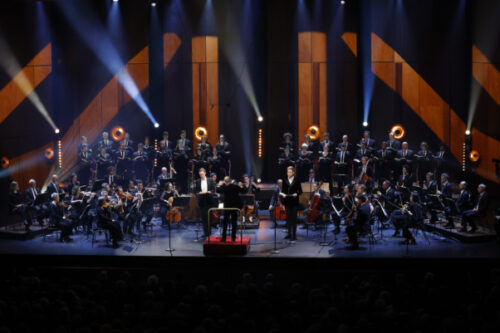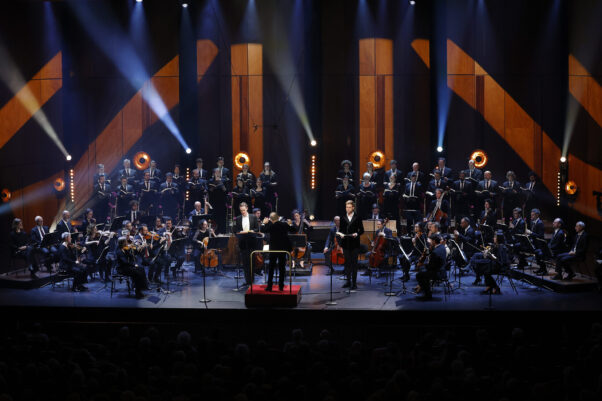 United Kingdom Bach, Matthäus-Passion, BWV 244: Ian Bostridge (Evangelist), Benjamin Appl (Jesus), Anna El-Hashem (soprano, Uxor Pilati), Mari Askvik (alto), James Way (tenor), Thilo Dahlmann (baritone, Judas, Petrus, Pilatus), Wei-Lian Huang, Aurélie Moreels (Ancilla I & II), Samuel Namotte, Vlad Vrosman (Pontifex I & II), Namur Chamber Choir, Les Talens Lyriques / Christophe Rousset (conductor). Grand Théâtre de Provence, Aix-en-Provence, 7.4.2023. (CC)
United Kingdom Bach, Matthäus-Passion, BWV 244: Ian Bostridge (Evangelist), Benjamin Appl (Jesus), Anna El-Hashem (soprano, Uxor Pilati), Mari Askvik (alto), James Way (tenor), Thilo Dahlmann (baritone, Judas, Petrus, Pilatus), Wei-Lian Huang, Aurélie Moreels (Ancilla I & II), Samuel Namotte, Vlad Vrosman (Pontifex I & II), Namur Chamber Choir, Les Talens Lyriques / Christophe Rousset (conductor). Grand Théâtre de Provence, Aix-en-Provence, 7.4.2023. (CC)

This year, the Festival de Pâques at Aix-en-Provence celebrates its tenth anniversary; coinciding nicely with the 30th anniversary season of Les Talens Lyriques. While Les Talens Lyriques and Christophe Rousset are no strangers to Seen and Heard International, most of the reviews have been of French or Italian music (with an emphasis on the French), so hearing them in Bach was doubly fascinating – and, as it turned out, enriching.
Not for Rousset a St Matthew preserved in aspic. Not for Rousset an over-reverential, near Gothic reading. We can leave that to the Klemperers of this world. Here, the sensitivité of France and the onward theatrical sense of Italian Baroque opera conspired to create something new: a highly dramatic event that took us into the space of a very human drama. Jesus was a human, born of a woman and capable of all human emotions, including pain on the cross. This, coupled with the seared-in rapport between Rousset and his band of players (arranged, like the choir, into two groups) led to an unforgettable account – certainly the most successful this writer has heard.
Chorales always moved – a momentum that is vital for the ongoing story. A particularly noteworthy example seemed to be the brightness of ‘Mir hat die Welt trüglich gericht’ towards the beginning of the second part, but examples really did abound; and not once was the expressive effect of the chorales interrupted or downplayed.
Distribution of players is important in this piece, of course, and Rousset honoured the bipartite split of both orchestra and chorus. The standard of playing, too, was consistently sublime, not least in the tricky moments for low oboes and oboes d’amore. The sheer freshness we heard was remarkable: passages such as the instrumental opening of ‘So ist mein Jesus nun gefangen’ were heard anew, Bach’s invention notably daring (with remarkable, keenly-felt interjections by the choir). Rarely has the opening chorus, ‘Kommt, ihr Töchter, helft mir klagen’ felt so gripping and yet so transparent of vocal texture; yet the sheer beauty of sound itself was almost overwhelming. The cries of ‘Seht! Wohin?’ had a special potency here, an urgency rarely heard, that set the tone for the entire performance. Impressive, too, how Rousset lightened the texture so effectively for the opening mezzo aria of the second part, ‘Ach, nun ist mein Jesus hin!’. And has there been a performance where the modernity of scoring (the punctuating oboes) has made such an impact in the tenor recitative, ‘Mein Jesus schweigt zu falschen Lügen stille’?

The chorus plays a vital part in the Matthew Passion, and the Namur singers put not a syllable wrong. But soloists, too, have to be carefully judged, and Rousset is a past master of casting (as one can see from his extended series of Lully opéra recordings, for example). The mezzo-soprano Mari Askvik was superb from the off in ‘Du lieber Heiland du’ with its pair of obbligato flutes; Rousset prefers mezzo to male alto/countertenor here. ‘Buss und Reu’ worked beautifully, and the only place that felt slightly odd with this type of voice was ‘Erbarme dich’ (much later in the piece) – memories of Damien Guillon with Masaaki Suzuki on Suzuki’s second BIS recording were not fully erased. It boasted in Aix, however, a superb violin obbligato from Gilone Gaubert.
Soprano Anna El-Khashem was marvellously clear-voiced in her ‘Ich will dir mein Herze schenken’, a fabulous meeting of soloist and Talens Lyriques wind players. She is a real singer to watch out for. James Way was an expressive solo tenor; the only slightly weak link was the bass-baritone Thilo Dahlmann, whose intonation was not always spot-on, but thankfully finding form for the important bass aria towards the end, ‘Mache dich, mein Herze, rein’, and offering a generally dramatic Judas.
As the Evangelist, Ian Bostridge offered a dramatic reading, although one that only strained at Bachian restraints towards the end with one moment of pre-Expressionist near-Sprechgesang. His range is perfect for the role, his extreme upper register almost trumpet-like; and angst and Bostridge are musical friends, given his speciality is Schubert’s Winterreise. His diction, too, was nicely allied to the dramatic delivery, tracing natural speech rhythms. It was a magnificent achievement from a singer who on occasions can seem rather over-the-top; his Jesus was Benjamin Appl, who seemed less secure than his recordings might imply, and at least initially over-beautifying his lines.
This was a Matthäus-Passion of overwhelming impact precisely because of its dynamic thrust. The true stars were Les Talens Lyriques and Rousset. You can see and hear a short excerpt from this performance here for free, and the complete Matthäus-Passion of April 7 (video director Olivier Simonnet) is available to subscribers of mezzo.tv.
Colin Clarke
